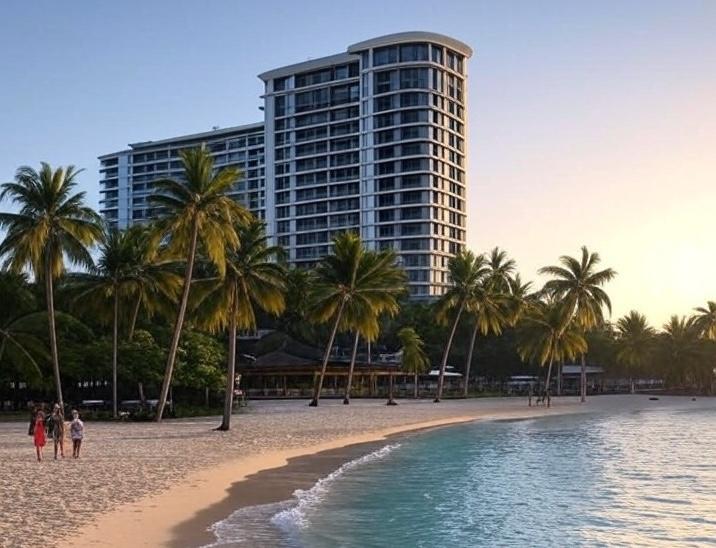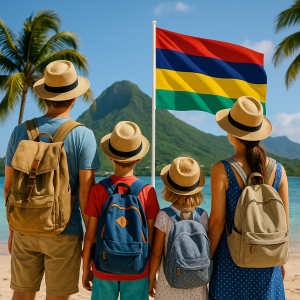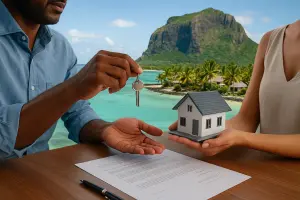
The different real estate regimes in Mauritius: IRS, RES, PDS, and G+2.
- 11 Jul 2025
- |
- by Jérôme Pohier
- |
- Taxation , Real Estate
- |
- #Tag 1
- #Tag 2
Mauritius is increasingly establishing itself as a prime destination for investors eager to combine an exceptional setting with attractive real estate investment opportunities. Beyond its recognized tourist appeal, the country has legally structured itself to welcome foreign buyers through real estate regimes rigorously regulated by the Mauritian government. Among these frameworks, the Property Development Scheme (PDS) and the Integrated Resort Scheme (IRS) play a central role in promoting prestigious properties while ensuring favourable conditions for acquisition and residency. These schemes support a rapidly changing market aimed at combining quality of life, sustainable development, and legal security for investors.
The recent harmonization of real estate frameworks, notably the gradual replacement of the old IRS and RES (Real Estate Scheme) schemes by the PDS, reflects the desire to structure a sector that is a source of jobs and rich in prospects. Thanks to precise commitments regarding high-end constructions, as well as advantageous tax frameworks, these programs grant foreign investors the opportunity to acquire full ownership while benefiting from an attractive residence permit. These conditions strengthen confidence in an expanding real estate market, supported by key public players such as the Economic Development Board (EDB) and the Board of Investment, who ensure compliance with acquisitions.
Buying in Mauritius: Why choose PDS and IRS programs to invest in prestigious real estate
Mauritius, a prime destination for foreign investors in real estate
With its idyllic landscapes, tropical climate, and political stability, Mauritius attracts an international clientele in search of an exceptional quality of life. This appeal is accompanied by a dynamic real estate market where foreign investors play an increasing role. Mauritian legislation offers several specific regimes allowing for full ownership acquisition, a rarity in many island markets.
Investors are drawn to prestigious real estate programs that not only ensure the longevity of their capital but also offer substantial appreciation prospects. Mauritius's positioning as a regional economic hub also contributes to this attractiveness. For several years, the Mauritian government has implemented reforms to further structure this sector and encourage sustainable investments, particularly through arrangements tailored to the expectations of international buyers.
-
Political and economic stability fostering confidence
-
Clear legislative framework and legal protections for acquisitions
-
Possibility of obtaining a residence permit for foreign investors
-
Favorable ecosystem for luxury, high-end services and rentals
Understanding the PDS and Integrated Resort Scheme (IRS) frameworks: legal framework and recent developments
The Property Development Scheme (PDS) is now the reference regime. Launched to unify and simplify the previous IRS and RES mechanisms, it sets strict standards for construction, landscape integration, and social aspects. The PDS notably requires a minimum of 6 residences built on large plots of land, with common spaces and services ensuring a quality living environment.
The Integrated Resort Scheme (IRS), on the other hand, primarily targeted luxury villa and residence projects within complexes incorporating prestigious amenities. Although some IRS projects are still underway, the majority of new constructions are now taking place under the PDS regime. The shift to the PDS represents a turning point towards more sustainable, equitable, and better-regulated projects in accordance with the new requirements of the Board of Investment, in coordination with the Economic Development Board (EDB).
|
Characteristic |
IRS |
PDS |
RES |
|---|---|---|---|
|
Creation date |
1990 |
2019 (replaces IRS and RES) |
1989 |
|
Type of properties |
Luxury villas, apartments |
Villas, apartments, penthouses |
Apartments, secondary residences |
|
Minimum land area |
Variable |
Between 1 and 50 acres |
Variable |
|
Residence permit |
Yes |
Yes |
No |
|
Taxation |
Various exemptions |
Attractive and simplified taxation |
Less advantageous |
Everything you need to know about the Integrated Resort Scheme (IRS): Luxury villas, advantageous taxation, and residence permits
Main features of IRS projects: Villas, apartments, and high-end services
The IRS has long distinguished itself as a preferred scheme for high-end real estate projects in Mauritius. IRS complexes often include spacious villas, high-standard apartments, and vacation residences integrated with luxury infrastructures such as golf courses, marinas, spas, or beach clubs.
These properties cater to a foreign clientele in search of exclusive settings offering tranquility and refinement. Full ownership guaranteed by the IRS regime allows for resale or rental for those wishing to make their property a source of income. Tailored services are generally offered in these projects, thus enhancing the attractiveness of the offer for discerning investors.
-
Villas with generous spaces, often with private pools
-
Residences or apartments in secured complexes
-
Access to premium leisure and facilities (golf, spa, marina)
-
Concierge and maintenance services included
Taxation under IRS: Exemptions, fund transfers & tax benefits for foreigners
The taxation applied under the IRS is particularly advantageous for foreign investors. They benefit from a total exemption from income tax on their real estate properties. There are no inheritance taxes or property taxes, which is a significant advantage in wealth transfer.
The regime also allows for the free transfer of funds internationally without restriction, facilitating the management and resale of properties. The minimum investment threshold to access this regime is set at 375,000 USD excluding taxes, ensuring a high level of property ownership. This favorable taxation has contributed to making the IRS a preferred option, especially before the rise of the PDS.
Obtaining a residence permit and purchase conditions in the IRS
The Integrated Resort Scheme allows foreign investors to obtain a residence permit linked to the acquisition. This right is a major asset that facilitates their establishment in Mauritius, as well as that of their family. The property purchased under this regime grants access to the same rights as a typical Mauritian resident, contributing to integration into the country.
It is important to emphasize that the purchase must be validated by the Economic Development Board (EDB), which ensures compliance with regulatory requirements. Only acquisitions in projects approved under the IRS are entitled to the corresponding benefits and permits.
IRS purchase procedure: Administrative steps, deposit payment, and validation by the EDB
-
Signing a reservation contract with the developer
-
Payment of a secured deposit (generally 10 to 20%)
-
Submission of an application to the EDB for project approval and issuance of the acquisition permit
-
Execution of the authentic deed before a notary
-
Compliance with the staggered payment process, especially in the case of off-plan purchases
-
Official obtaining of the residence permit once the transaction is finalized
Property Development Scheme (PDS): The new standard for a secure real estate purchase in Mauritius
The specifics of the PDS: Sustainable projects, social integration, and diversity of real estate
Deployed to regulate real estate in accordance with environmental and social requirements, the Property Development Scheme embodies the new standard in Mauritius. PDS projects are required to meet strict criteria aimed at sustainability, urban integration, and community cohesion.
The scheme advocates for diversity in the types of properties offered, including villas, apartments, and penthouses, thereby catering to the varied expectations of investors. Moreover, the provision of communal services such as security, green spaces, and recreational facilities contributes to a privileged living environment.
-
At least 6 residences on land between 1 and 50 acres
-
Integration of public spaces and communal services
-
Compliance with environmental and energy standards
-
Social diversity and assured architectural quality
Buying under PDS: Permanent residence permit, choice of properties, and attractive taxation
This scheme offers investors the opportunity to obtain a permanent residence permit under simplified conditions, with a minimum investment of 375,000 USD. This permit is also valid for the spouse and children up to 24 years old, enhancing the family appeal of the formula.
The taxation related to the PDS is particularly advantageous: no capital gains taxes, exemptions from customs duties on imported materials and equipment, no property taxes or housing taxes. This policy aims to stimulate the acquisition and sustainable establishment of foreign investors in the territory.
-
Permanent residence permit for the investor and their family
-
Reduced taxation on income and transfers
-
Ability to rent out the property freely
-
Wide range of properties: villas, apartments, penthouses
PDS vs IRS Comparison: What real estate investment opportunities in Mauritius in 2025?
Strengths and limitations of PDS and IRS for foreign investors
While the IRS remains tolerated for certain existing projects, the PDS has established itself as the preferred solution for any new construction, offering a stricter and more resilient framework. The PDS emphasizes sustainable development, architectural quality, and social cohesion—elements that were not always at the heart of IRS projects.
However, the IRS may retain its appeal due to its historical presence in already established residences and its recognition. Investors must therefore evaluate their priorities, whether it be the sustainability and modern standards of the PDS or the existing projects under the IRS.
|
Criterion |
PDS |
IRS |
|---|---|---|
|
Sustainability |
High standards imposed |
Older standards |
|
Residence permit |
Permanent |
Renewable |
|
Types of properties |
Villas, apartments, penthouses |
Villas and luxury residences |
|
Service ecosystem |
Social integration and communal spaces |
Individual high-end services |
VEFA (Sale in Future State of Completion) and guarantees offered in PDS & IRS projects
VEFA constitutes a preferred mode of purchase in these programs, offering the investor the opportunity to acquire a property off-plan, with a clear and secure payment schedule. This method is recommended both under PDS and IRS, ensuring transparency and client protection.
-
Completion guarantee provided by the developer
-
Ten-year insurance covering major defects
-
Legal protection through a clear and regulated contract
-
Ability to pay in multiple stages corresponding to construction phases
Other schemes complementing PDS and IRS: SCS, G+2, RES, and options according to your objectives
Mauritius offers other lesser-known but equally interesting schemes, adapted to specific investor profiles or particular projects:
-
Smart City Scheme (SCS): for multifunctional developments integrating office, residential, and commercial.
-
G+2: concerns real estate projects with a maximum height of 3 floors, often for local use.
-
Real Estate Scheme (RES): still active for some older projects, focusing on apartments and second homes.
-
Integrated Housing Scheme (IHS): dedicated to social and accessible residences.
These options complement the PDS and IRS, offering investors an extensive palette to meet their ambitions, whether residential, commercial, or mixed. A precise analysis of investment objectives and local constraints is therefore necessary.
To deepen the diversity of real estate investment models in Mauritius and their specifics, it is advisable to consult specialized resources, such as the available investment models.
FAQ
What is the minimum cost to invest under the PDS regime?
The investment threshold is set at 375,000 USD excluding taxes. This amount allows access to the residence permit for the investor and their family.
Can acquired properties be rented under the PDS or IRS?
Yes, renting properties is allowed, providing a supplementary income source for investors.
Who validates real estate transactions under PDS or IRS?
The Economic Development Board (EDB) is the body responsible for approving projects and acquisitions under these regimes, ensuring their compliance.
What are the main tax advantages of the Property Development Scheme?
Exemption from capital gains taxes, no property tax or housing tax, and exemptions from customs duties on imported materials.
What is the major difference between PDS and IRS?
The PDS is a unified and modern framework focused on sustainability and social integration, while the IRS is more about historical luxury projects with less stringent standards.







